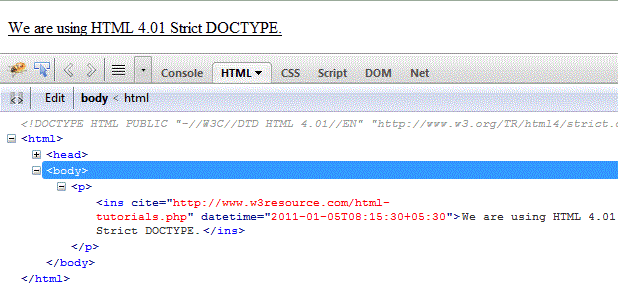HTML ins tag and element
1. HTML ins (inserted text) element represents a run of text, which has been inserted into a document, while a different version of the document does not have that text.
2. Often HTML ins element is used along with del element.
Syntax
<ins>text</ins>
Category
HTML ins element can be used as an inline element as well as a block level element.
Whether both start and end tags are required
Yes.
Can contain
HTML ins element can contain inline elements and block-level elements.If this element is used as an inline element, not block level element should be used within the ins element.
The following example is an inappropriate use of ins element.
<p><ins><div>Some text..... </ins></div></p>
Can reside within
HTML ins element can reside within inline as well as block level elements.
Attributes
Attributes specific to this element
| Attribute | Value | Description |
|---|---|---|
| cite | An url. | Value of the attribute points to a source document or message. |
| datetime | Date and time. | The value of the attribute specifies the date time, when the text had been inserted. |
Identifiers
language information and text direction
Title
Style
Events
onclick, ondblclick, onmousedown, onmouseup, onmouseover, onmousemove, onmouseout, onkeypress, onkeydown, onkeyup.
Supported doctypes
HTML 4.01 Strict, HTML 4.01 Transitional, and HTML 4.01 Frameset.
Example of using HTML ins element
<!DOCTYPE HTML PUBLIC "-//W3C//DTD HTML 4.01//EN" "http://www.w3.org/TR/html4/strict.dtd">
<html>
<head>
<meta http-equiv="Content-Type" content="text/html; charset=iso-8859-1">
<title>html ins tag example</title>
</head>
<body>
<p><ins datetime="2011-01-05T08:15:30+05:30" cite="https://www.w3resource.com/html/HTML-tutorials.php">We are using HTML 4.01 Strict DOCTYPE.</ins></p>
</body>
</html>
Result

View this example in a separate browser window
Pictorial presentation

Previous: HTML pre tag and element
Next: HTML del tag and element
Test your Programming skills with w3resource's quiz.
